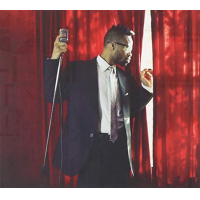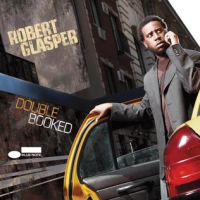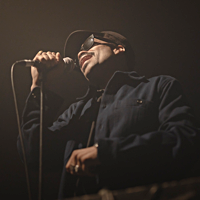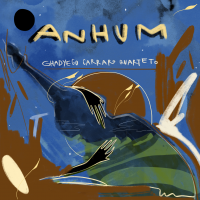Home » Jazz Musicians » Bilal
Bilal
If there was one R&B artist for whom the neo-soul categorization seemed limiting, it was Philadelphia native Bilal. None of his recordings resembled the sycophantic worship of soul artists who thrived in the '60 and '70s, and it wasn't just because his voice — classically trained, capable of singing opera in seven languages — was so unique. While some inspirations were detectable, his recordings were wholly modern and became increasingly creative. His individuality led to being dropped from a major label, and he went several years without releasing any solo material. Through evangelism from his peers and word of mouth from his early fans, Bilal gained an insatiable following and was supported by sympathetic independent labels, where he was finally able to thrive creatively.
Bilal Sayeed Oliver came up in Germantown, a northwest neighborhood of Philadelphia, Pennsylvania. A deep interest in jazz was fostered by his father, who took him to the city's clubs. Singing eventually became more than an interest. He attended New York's New School for Jazz and Contemporary Music, where he received voice training, as well as training in jazz and big-band arrangements.
Grenique's Black Butterfly, a 1999 release on Motown, was the first major album to feature Bilal's vocals; he contributed to three songs. The following year, he established a deep connection to hip-hop by appearing on Common's Like Water for Chocolate and Guru's third Jazzmatazz album. These recordings led him into the Soulquarians, a rotating collective of collaborators who included Common, Jay Dee (aka J Dilla), the Roots' Ahmir Thompson, D'Angelo, Erykah Badu, Mos Def, Q-Tip, and Raphael Saadiq within its ranks.
A turbulent solo deal with Interscope resulted in Bilal's debut album, 1st Born Second. An exemplary neo-soul release featuring collaborations with Mike City, Robert Glasper, and many of the Soulquarians, it was issued in July 2001 and reached the Top Ten of Billboard's R&B albums chart. One of its three singles, "Soul Sista," peaked at number 18 on the R&B singles chart, while "Fast Lane" — co-written with Damu and Faulu Mtume (the sons of James Mtume and two of the singer's earliest supporters) — narrowly missed the Top 40. At that point, the closest points of comparison were D'Angelo and Maxwell, yet Bilal was more dynamic than the former and less mannered than the latter. 1st Born Second carried an energy that neither one of those singers, as hot as they were at the time, could boast.
Read moreTags
Bilal at Village Underground at the 2025 EFG London Jazz Festival

by Nosa Malcolm
The first thing to understand about Bilal is this; there are no boundaries to where he can take his voice, and this night was no exception. With the annual EFG London Jazz Festival bringing a plethora of talent over a two-week period and covering most of London, Village Underground, with its brick walls and stripped back aesthetic, felt like a venue suited to a night of raw musical excellence. Surrounded by people in awe and intimate enough to feel like ...
Continue ReadingOrrin Evans and the Captain Black Big Band: Walk A Mile In My Shoe

by Steve Plever
A glance through the track list--with covers of Stevie Wonder and Marvin Gaye and two swing-era vocal standards--could give you the wrong impression. Yes, this is a very accessible and soulful album, but it is serious and heartfelt jazz, with Orrin Evans' personal stamp making it work. Blues, soul and gospel sounds share the stage here with swing, straight-ahead and avant-garde influences--no surprise given Evans' decade of playing with the Mingus Big Band. Evans' piano sets the tone ...
Continue ReadingOrrin Evans and the Captain Black Big Band: Walk A Mile In My Shoe

by Angelo Leonardi
Il nuovo disco di Orrin Evans e della sua Captain Black Big Band ci ricorda l'importanza delle radici per la comunità musicale afroamericana: il gospel, il blues, le big band, i cantanti e strumentisti storici. Una risorsa che è anche identità collettiva e forza culturale. Come ha sempre fatto in passato, il pianista e bandleader di Philadelphia s'ispira alla tradizione per rinnovarla e arricchirla, con passione e freschezza. Stavolta le orchestrazioni sono funzionali alle interpretazioni di quattro prodigiosi ...
Continue ReadingRobert Glasper: Canvas

by Chris May
Of the three dozen albums released in Blue Note's 180gm vinyl Blue Note 80 reissue series, Robert Glasper's 2005 debut, Canvas, is the only one recorded in the twenty-first century. Almost all of the other releases were recorded during Blue Note's 1950s and 1960s belle epoque. It is a singular distinction and an appropriate one, for several reasons. Top of the list is Glasper's place in jazz's piano trio lineage. Since Bill Evans elevated piano trios to ...
Continue ReadingRobert Glasper: Canvas

by Abe Pollack
Many young jazz musicians are no strangers to pop music. More familiar with Radiohead's Kid A and Public Enemy than Jerome Kern or Cole Porter, they have become increasingly more adventurous in an attempt to make jazz a commodity for the 21st Century. Unlike glossy pop covers from the '80s, Robert Glasper uses subtlety to explore late-20th Century music. This is no surprise. Having performed with Q-Tip, Bilal and Meshell Ndegeocello, Glasper finds comfort and room to ...
Continue ReadingRobert Glasper: Canvas

by Mark F. Turner
In addition to unveiling gems from the past like John Coltrane and Thelonious Monk's At Carnegie Hall, Blue Note continues to spotlight the musicians of present with recordings like Robert Glasper's Canvas. Similar to Jason Moran, Jacky Terrasson, and Bill Charlap, who also record for Blue Note, Glasper has the vision and ability to create a fresh statement within the jazz piano idiom. Following on the heels of his well received 2004 debut, Mood, this recording continues to reveal his ...
Continue ReadingRobert Glasper: Canvas

by Woodrow Wilkins
Robert Glasper Canvas Blue Note Records 2005
Wow! That's the first expression that came to mind when I heard “Rise and Shine, the opening track on Canvas. Pianist Robert Glasper's trio--including Vicente Archer on bass and Damion Reid on drums--is as tight as a unit can. This aptly named tune, sure to help many a dreary eye awaken, sizzles from start to finish. And it's just a prelude of things to come.The ...
Continue ReadingBilal Announces Two Shows At Harlem Stage On March 27

Source:
Matt Gross
Forever pushing boundaries with his eclectic sound, Grammy-nominated artist and transcendent live performer Bilal returns to Harlem Stage to present new music from his exciting collaboration with Adrian Younge, a producer/composer/musician, heralded as “the next generation of soul music." A classically trained vocal veteran, Bilal released his debut album, 1st Born Second, in 2001, which boasted the popular single “Soul Sista.” Although the follow-up, Love for Sale (2006), was shelved, it later leaked online, receiving praise from fans and music ...
read more
Aloe Blacc, Bilal, Chris Turner, Miguel Atwood-Ferguson, Berklee Neo-soul Ensemble & Contemporary Symphony Orchestra Perform Tribute To Storied Marvin Gaye Album Dec. 4
Source:
Berklee Media Relations
Berklee's 2014-15 Signature Music Series continues as Berklee and Revive Music present the first live performance of Marvin Gaye's storied album, Vulnerable, on December 4. The concert features special guest Aloe Blacc, who co-wrote and sang on Avicii's chart-topping single “Wake Me Up," and whose current album, Lift Your Spirit, includes the hit song “I'm the Man." The all-star lineup also includes Bilal, a genre-bedning R&B/jazz vocalist who has collaborated with Beyonce, Jay-Z, and Common; funk/soul crooner Chris Turner, who ...
read more
Bilal "A Love Surreal" CD Release, Tuesday, February 12 At Highline Ballroom

Source:
Carolyn McClair Public Relations
BILAL “A Love Surreal" CD Release Produced By Jill Newman Productions Tuesday, February 12, 2013 Highline Ballroom, 431 W.16 Street, NYC, (212) 414-5994 Showtime @ 9:00 PM, Doors open @ 7:00 PM Tickets $25 in advance, $30 day of show BIO Bilal Oliver was born and raised in Philadelphia, PA. Coming from what he describes as a “regular kind of neighborhood”, Bilal was first introduced to music when he attended a small local church. The congregation, made up of mostly ...
read more
Jill Newman Productions Presents Sly & the Family Stone, Jimmy Scott, Bilal, Derrick Hodge and Others

Source:
All About Jazz
JILL NEWMAN PRODUCTIONS PRESENTS EXCITING CALENDAR OF EVENTS including SLY & THE FAMILY STONE, JIMMY SCOTT BILAL, DERRICK HODGE & OTHERS NEW YORK, NY, October 29, 2007 - Jill Newman Productions, renowned across the nation for high-quality, diverse music productions, announces an exciting calendar of events, including the UNITED STATES PREMIERE OF THE TRIUMPHANT RETURN OF SLY & THE FAMILY STONE, Jimmy Scott, Bilal, Derrick Hodge and others. Calendar of Events: WORLD PREMIERE OF ...
read more
Bilal Dec. 9-10 a the Iridium Jazz Club

Source:
Jim Eigo, Jazz Promo Services
IRIDIUM JAZZ CLUB 1650 BROADWAY (Corner of 51st) NEW YORK, NY 10023 RESERVATIONS: 212-582-2121 8:30 & 10:30PM, Fri. & Sat. 3rd Sets AT MIDNIGHT NEW LISTING Dec. 9-10 BILAL-vocal with CHRIS DAVE-drums & TBA-piano NO 3RD SET SATURDAY There once was a time the elders and the sanctified, when walking through a sacred place, held one hand up, and on that one raised hand, pointed their ...
read more
Cassandra Wilson, Stephanie Mills, Rahsaan Patterson, Bilal, Mark Cohn, And Yerba Buena Featuring Andre Levin Set To Join Meshell Ndegeocello For GMHC'S "You Rock My Soul", An Aids Benefit Concert

Source:
All About Jazz
Carnegie Hall, November 11th.
Tony Award Winner, Heather Headley, To Perform At Exclusive Post-Concert Reception At Club Guastavinos.
Critically acclaimed musician and songwriter Meshell Ndegeocello will be joined on stage by Cassandra Wilson, Stephanie Mills, Rahsaan Patterson, Bilal, Mark Cohn and Yerba Buena featuring Andre Levin for You Rock My Soul, in a star-studded gala event at New York's Carnegie Hall on November 11th (7:30pm-9:30pm) benefiting Gay Men's Health Crisis (GMHC).
Meshell Ndegeocello, who plays double duty as musical director ...
read more

















